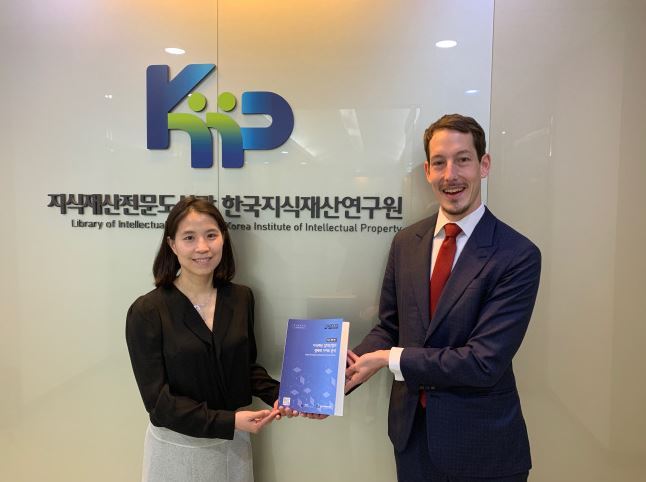‘IP-intensive industries have tangible impact on economy’
Korea Institute of Intellectual Property finds correlation between IP and economic impact
By Bae HyunjungPublished : April 24, 2019 - 16:58
Intellectual property is perceived as an essential tool for knowledge-based innovation, especially in the context of the “fourth industrial revolution,” but when it comes to actual legislation, the lack of quantitative information has often acted as an obstacle for policymakers and market players.
In light of this limitation, a think tank of South Korea’s IP office has compiled an extensive study on the impact that IP-intensive industries have on the economy, measuring the tangible benefits of IP.
“Unlike in the conventional labor-intensive or capital-intensive industries, it has been difficult to measure the economic effects of IP-intensive industries,” Lim Hyo-jeong, an associate research fellow at the Korea Institute of Intellectual Property, told The Korea Herald in an interview.
“But by classifying industries according to their degree of IP intensity, we were able to find a correlation between IP and its actual impact on the country’s economy.”
In a latest report, KIIP, a subsidiary of the Korean Intellectual Property Office, analyzed that industries defined as IP-intensive generated 560 trillion won ($487 billion) or 43.1 percent of the country’s gross domestic product in 2015. Asia’s fourth-largest economy therefore outpaced Europe (42.3 percent), the United States (38.2 percent) and China (32.1 percent).
The employment contribution was also high, with more than 6 million people employed in IP-intensive industries, accounting for 29.1 percent of the nation’s total workforce in 2015. The corresponding figures for Europe and the US were 27.8 percent and 18.2 percent, respectively.
In light of this limitation, a think tank of South Korea’s IP office has compiled an extensive study on the impact that IP-intensive industries have on the economy, measuring the tangible benefits of IP.
“Unlike in the conventional labor-intensive or capital-intensive industries, it has been difficult to measure the economic effects of IP-intensive industries,” Lim Hyo-jeong, an associate research fellow at the Korea Institute of Intellectual Property, told The Korea Herald in an interview.
“But by classifying industries according to their degree of IP intensity, we were able to find a correlation between IP and its actual impact on the country’s economy.”
In a latest report, KIIP, a subsidiary of the Korean Intellectual Property Office, analyzed that industries defined as IP-intensive generated 560 trillion won ($487 billion) or 43.1 percent of the country’s gross domestic product in 2015. Asia’s fourth-largest economy therefore outpaced Europe (42.3 percent), the United States (38.2 percent) and China (32.1 percent).
The employment contribution was also high, with more than 6 million people employed in IP-intensive industries, accounting for 29.1 percent of the nation’s total workforce in 2015. The corresponding figures for Europe and the US were 27.8 percent and 18.2 percent, respectively.

“South Korea owes its high figures not only to its advanced technology but also to its industrial structure that is largely reliant on technology patents, whereas the US and EU markets tend to lean towards copyrights and design rights,” Lim said.
IP-intensive industries, according to the KIIP report, refer to those that “have high intensity of intellectual activities, (and) protect and utilize them in value creation.”
These IP-focused sectors not only contributed to yearly figures, such as GDP, but also formed a key axis in mid- and long-term development in research and development. Korea’s IP-intensive industries invested 24 trillion won or 77.9 percent of the country’s total investments in 2015, the report showed.
Welcoming KIIP’s findings was the European Chamber of Commerce in Korea, which has been seeking to fight counterfeits and other violations of intellectual property rights here.
“When fighting against counterfeits, we always had limited access to facts and figures (concerning acts of violation), so we took a different approach and focused on quantifying the benefits of IP,” said Sven-Erik Batenburg, director of legal and international affairs and of the intellectual property rights committee at ECCK.
“These empirical figures are crucial as they underline the tangible effect of IP and consequently lead to proper IP protective measures.”
The European Patent Office had published a similar report in Europe in 2013 and updated related statistics in 2016, as part of continued efforts to quantify the economic impact of IP, the director said.
In addition, the study marks an important step in IP policies in Korea, which, despite its fast economic growth, still finds itself at a relatively early phase in terms of IP appreciation and the protection of intangible rights, the ECCK official added.
In our survey conducted last year, 96 percent of the respondents viewed counterfeits as negative yet over 50 percent of them nevertheless had experience of purchasing counterfeited goods,” Batenburg said.
“This is why detailed figures are needed to rectify such imbalance in public recognition.”
While stressing the significance of the latest report, the KIIP researcher pointed out that government statistics need to be improved for the sake of more relevant data.
“Our report refers to the year 2015 as it was based on Statistics Korea’s comprehensive industrial data that is released every five years,” Lim said.
“The current five-year cycle is insufficient considering the fast-paced changes in the IP sector.”
By Bae Hyun-jung (tellme@heraldcorp.com)







![[KH Explains] How should Korea adjust its trade defenses against Chinese EVs?](http://res.heraldm.com/phpwas/restmb_idxmake.php?idx=644&simg=/content/image/2024/04/15/20240415050562_0.jpg&u=20240415144419)











![[Today’s K-pop] Stray Kids to return soon: report](http://res.heraldm.com/phpwas/restmb_idxmake.php?idx=642&simg=/content/image/2024/04/16/20240416050713_0.jpg&u=)